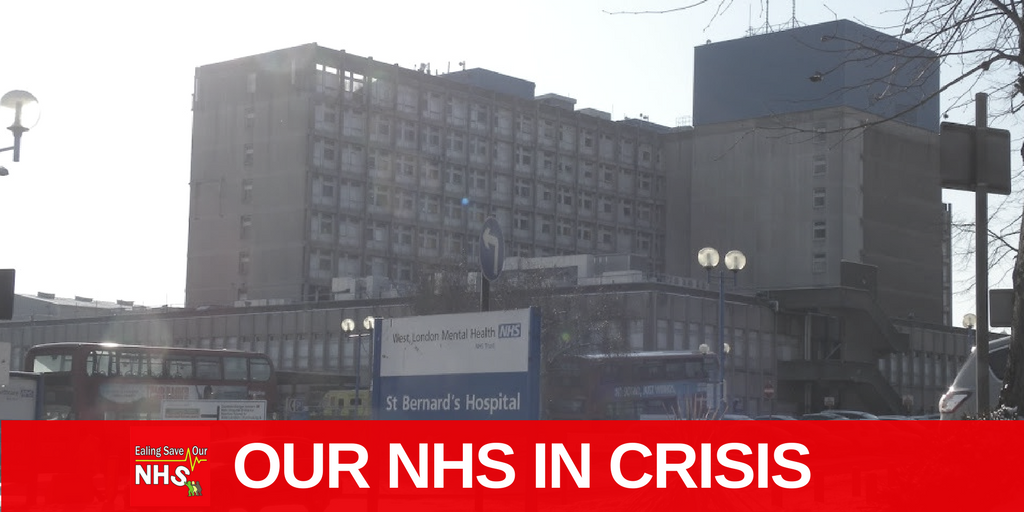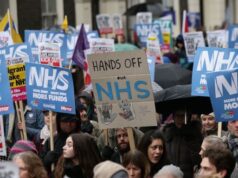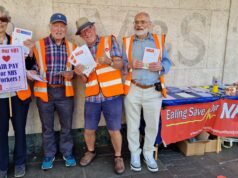Issue: 61
Plans to Transform NHS North West London’s Care Services Still in Disarray
NHS North West London (NWL) is possibly unique in England in having not one, but two major different care transformation programmes in play at the same time. The 2012 ‘Shaping a Healthier Future’ (SaHF) project is still attempting to implement ‘changes that will improve (health) care both in hospitals and the community and save many lives each year’. The 2016 NHS NWL Sustainability and Transformation Plan (STP) attempts to improve health and wellbeing, improve (and integrate) healthcare services and social care services, improve productivity and close the financial gap. Both the SaHF and the STP postulate major financial saving accruing for massively reducing annual Non-Elective hospital admissions (NELs). The ‘replacement’ for NELs will be treatment at home, in community healthcare day centres (‘hubs’) and in some expanded GP services. This latter treatment modality is often called Out Of Hospital (OOH) services
NHS NWL SaHF and the STP were effectively halted in November 2017 when the SaHF business case (IMBC SOC1) was rejected by NHS England (London) and NHS Improvement (London). The rejection was on the basis of lack of evidence to support an annual reduction of Non-Elective hospital admissions (NELs) by 99,000 by 2025/26. On 9 February 2018 NHS NWL bosses were scheduled to meet with NHSI/NHSE (London) at which they hoped to supply the missing evidence. On 13 March 2018 we discovered that the 9 February 2018 meeting had been cancelled by NHSE/NHSI.
The IMBC SOC1 business case asks for £513 million for building work. However waiting in the wings is IMBC SOC2 which will ask for another £314 million for building work in ‘inner’ NWL. If this amount of cash for the builders in NWL is typical, then in London the cash for builders for NHS STPs will be £4.1 billion and nationally it would be £36.3 billion. Surely this is all pie in the sky?
The Curious Case of MCAP, Finnamore, NHS Bosses, Freedom of Information and The Truth
In 2012 NHS North West London (NWL) launched its ‘Shaping a Healthier Future’ (SaHF) project. Central to this project was improving healthcare services and reducing health care costs. The project mandated reducing the number of hospital admissions, District General Hospitals, hospital A&E units and hospital beds. Many more patients would be treated in their own homes, in community healthcare day centres (‘hubs’), and in some expanded GP surgeries. Our health would also be improved and cost savings achieved by measures which would somehow persuade us all to live healthier lives. These out of hospital services are variously referred to within the NHS as Community Services, Intermediate Services and Out of Hospital (OOH) Services.
A core component of this project was the theory, promulgated by American management consultants McKinsey & Co in 2009 and 2012, that 40% of patients in Acute care in hospitals should not be there. These 40% of patients should be successfully and less expensively treated using OOH services. In NHS NWL’s SaHF project there was clearly an aspiration to provide a proof of this theory. On 7 March 2013, an Invitation To Tender (ITT) was created by NHS NWL to find an organisation who could provide this ‘proof’ . It’s not clear how many suppliers responded to this ITT, but one supplier who did respond was Finnamore/Oak. Finnamore/Oak’s ITT response was reviewed and accepted – seemingly within just eight days. The Finnamore/Oak vehicle for providing this proof was called ‘Making Care Appropriate for Patients’ – MCAP. A one year contract to implement MCAP for £249,000 was signed on 12 April 2013. Surprisingly the project appears to have been curtailed in September 2013 after four months. Even more surprising was that Finnamore/Oak was paid even more money (£95,200) for ‘MCAP Implementation support – Extension’ in December 2013.
In November 2017 medical researcher Colin Standfield issued a Freedom of Information (FOI) request to NHS NWL about MCAP. After receiving no content bearing response, he issued a number of FOI requests about MCAP to NHS NWL. But no-one wanted to talk about MCAP. Why/how were Finnamore/ Oak chosen so quickly and were they the only ITT responder? What value for money was achieved in spending £344,200 on MCAP? What were the results/output from the four months of operating the Finnamore/ Oak MCAP programme? Does the abandonment of the MCAP project represent a failure to ‘prove’ that 40% of so called Non-Elective hospital admissions (NELs) can be ‘replaced’ by OOH services?
Seven senior NHS NWL executives chose MCAP in 2013. Three of them have left NHS NWL. One of those three – Kevin Atkins – left to join Finnamore/ Oak, then called GE Healthcare Finnamore In 2014, GE Healthcare Finnamore ‘sold’ him back to NHS NWL for a year at a cost of £98,000. One of the MCAP decision makers still in post at NHS NWL is Dr Mohini Parmar, who is the NHS NWL lead for its 2016 Sustainability and Transformation Plan (STP), as well as being the Chair of the Ealing Clinical Commissioning Group (ECCG). Her silence on the matter of MCAP is particularly deafening.
NHS Failings Caused 271 Deaths of Mental Health Patients 2011 to 2017
An investigation by ‘The Guardian’ has revealed these shocking statistics. Factors attributable to these deaths include:
+ Not following protocols
+ Treatment delays
+ Medication mistakes
+ Insufficient risk assessments.
Avon and Wiltshire Mental Health Partnership NHS Trust and Camden and Islington NHS Foundation Trust recorded the most deaths attributable to NHS failings.
Ealing Clinical Commissioning Group ECCG) Wants Ealing Residents to Help in Shaping Local Healthcare Services
Please tell ECCG what you want and what you don’t want at:
www.surveymonkey.co.uk/r/VC5DTTV
Is Parliament Fit for Purpose in Determining Healthcare and Social Care Policy and Legislation?
On 27 February 2018 a House of Commons Select Committee on Health and Social Care questioned three groups of expert witnesses on the subject of ‘Integrated Care: organisations, partnerships and systems, HC 650’. .
The first group of expert witnesses were impressive as they have between them over 100 years of NHS management, clinical and analytical experience. They were Professor Allyson Pollock, a renowned public health expert, Tony O’Sullivan, a retired Paediatrician and Co-Chair of ‘Keep Our NHS Publi’, Dr Graham Winyard, ex-Chief Medical Officer, NHSE and Dr Colin Hutchinson, Chair of ‘Doctors for the NHS’.
The MPs revealed a shocking level of ignorance, arrogance and disingenuousness. The Chair made repeated attempts to tease out of the experts answers that she clearly wanted. She went on and on about how difficult it is to get new legislation enacted through a hung parliament and described Integrated Care Partnerships as a ‘workaround’ existing legislation. I could hardly believe my ears!
One MP suggested that the leading ACOs/ICSs had been halted, so why all the fuss. The experts quoted Simon Stephens/NHSE statements (which strongly suggest the ACO/ICS pause was purely tactical). Another MP tried to claim that as private companies only had small percentage of NHS contracts, they then did not pose a threat to the public nature of the NHS. This is breathtakingly irrelevant because private healthcare companies are bidding for contracts all over England. Another waxed on about a trip they had made to Yorkshire where care professionals were all working together. He and other MPs deduced from this one visit that integrated healthcare and social care was alive and well. Pathetic.
All four experts told the MPs that they believed in care integration. However, they said that there is no evidence to support implementing this by creating unaccountable, non-public (ACO/ICS) bodies with 10/15 year, fixed price contracts. It might well be illegal anyway. An MP again suggested one might work around current legislation to make this work. One MP said that legal advice had been obtained to support this workaround. As some of the experts were involved in a Judicial Review which questions the legitimacy of ACO/ICS a meaningful dialogue on this was not possible.
Professor Pollock explained to the MPs about the significant differences in healthcare and social care patient databases. It was unclear whether the MPs actually understood what she was talking about. One MP said again that it would be difficult to get new care legislation through Parliament. Dr Hutchison pointed out that as it would just apply to England the chances of new legislation being introduced were much improved.
The King’s Fund opinions were thrown at the experts. The experts threw them back wrapped up in comments which to this writer at least seemed to imply that what the King’s Fund is proposing is possibly illegal.
To summarise the contents of this session – what the MPs were saying is that we have a square peg which we want to fit into a round hole. Can you work with us to shave bits off the corners of the peg so that it might fit? The experts, calmly and politely, wiped the floor with these uninformed, ill-equipped MPs who clearly did not want to listen to facts or engage in intelligent debate. It was like men against boys.
The following session of MPs v experts involved the BMA, the Royal College of Nursing (RCN) and Unite. There was more of how can STPs/ACOs/ICSs be ‘bent’ to make them work. Issues raised include balancing the NHS financial books by 2021, nursing standards and workforce engagement. The MPs’ trip to Yorkshire was brought up yet again. The wonderful nurses in Doncaster and that fabulous GP practice in Worksop. However, ‘one swallow does not a summer make’. The BMA made the point that a universal national ‘Worksop GP’ service would take new funding, more staff, improved infrastructure and technology. The BMA and the RCN were firmly against ACO/ICS and gave their reasons.
Unite’s concerns included cuts in NHS staff and capital spending, lack of information about a future NHS, terms and conditions of employment when working ‘across boundaries’, lack of information about non-clinical staff and repealing the Section 75 regulations enforcing market competition rules.
In the final MPs and ‘experts’ session, Healthwatch England (the largely ineffective State sponsored healthcare watchdog), Ipsos MORI (the polling agency) and two healthcare charities took their seats but did not gain my attention. Surely some of the local and regional healthcare activist groups should have occupied these seats? Ealing Save Our NHS, Defend Our NHS York and Sussex Defend the NHS are just a few of the tens of likely candidates.
View the proceedings at https://goo.gl/dvncKT
The National Audit Office Documents Only Failure in its ‘Reducing Emergency Admissions’ Report: NHS STP/ICS Plans in Tatters
On 1 March 2018, the National Audit Office (NAO) published a damning report on successive failed initiatives to reduce emergency admissions at NHS hospitals in England. The NAO scrutinises public spending and holds Parliament to account and to improve public services.
Apparently the Department of Health (DoH) wants elective and emergency admissions to be reduced to 1.5% (whatever that means). The NHS England (NHSE) mandate is however extremely weak in the admissions arena. – ‘…to achieve a measurable reduction in emergency admissions by 2020’.
Cost is a big issue here and reducing mortality and patient pain and suffering makes no appearance in the 54 page report. The current annual cost of emergency hospital admissions is £13.7 billion. This cost has remained static over recent years. Between 2015/16 and 2016/17 emergency admissions increased by 2.1%. So all attempts over recent years to reduce emergency admissions have failed.
No Proof Yet of the Theory that 40% of Those in Hospital Should Not be There
The elephant in the room here is the oft quoted 2009 McKinsey & Co ‘theory’ that 40% of patients admitted to hospital should not be there. The theory continues with the notion that Out of Hospital (OOH)/community care/intermediate services could ‘replace’ these hospital admissions. NHSE states that currently 24% of emergency admissions could be avoided. No ‘proof’ or evidence seemingly exists to ‘prove’ the 40% theory or even the 24% theory.
79% of the growth in emergency admissions from 2013/14 to 2016/17 was by people who did not stay overnight in hospital. Reducing beds (bed use) is clearly a key factor as staying overnight in hospital is expensive. The emergency admissions’ increase is mostly of older people.
It’s pretty clear that NHSE and partners attempts to reduce the impact of emergency admissions has failed. These funded reduction programmes include the urgent and emergency care programme, the new care models, the Better Care Fund, RightCare and Getting It Right First Time.
Re-admittance rates rose by 22.8% between 2012/13 and 2016/17. However, NHS Digital is planning to stop collecting, recording and publishing re-admittance rates!
Grant Funded Community Care Services Programmes have ‘Stalled’
In October 2017 the DoH admitted that £10 billion spent on community care ‘could have been better used’ and that ‘programmes to focus on community care had stalled’.
The DoH, NHSE and NHS Improvement (NHSI) all admit that they have no idea why there are local variations in hospital emergency admissions. NHSE is not happy with emergency admission data, and the lack of linked data across healthcare and social care.
On page 10 of the report we find ‘…the challenge of managing emergency admissions is far from being under control’.
There are enormous amounts of data analysis on performance, beds and intermediate care.
The number of days that beds are used by people admitted as emergency admissions has increased from 32.4 million in 2013/14 to 33.59 million in 2016/17 – an increase of 3.6%. The majority of bed days (96% in 2016/17) are used by people who stay for two days or more after being admitted as an emergency admission.
The recommendations in the report are stunning and include:
+ Establish an evidence base
+ Disseminate learning on new care models effectively
+ Link primary, community health and social care data
+ Figure out why there are local variations in emergency admissions
+ Figure out how community services will support reductions in emergency admissions
+ Introduce an Emergency Data Care Set to improve data on daycase emergency care
+ Publish data on re-admissions.
Are STP/ACO/ICS Initiatives Dead in the Water?
All this pours cold water on all 44 Sustainability and Transformation Plans (STPs), Accountable Care Organisations (ACOs) and Integrated Care Systems (ICSs) as they all postulate cost savings based on reduced hospital admissions, leading to closure of District General Hospitals and hospital A&E units. They all also postulate Out of Hospital/Community/Intermediate healthcare services as cost saving ‘replacements’ for Acute hospital care – and this is still an unproven theory. Finally the integration of healthcare services and social care services is talked about, but anecdotally on the ground it has not happened. Under current arrangements the dichotomy of business models, finances, patient databases, service access and cultures makes genuine integration an impossibility. Clearly the STP/ACO/ICS dream of balancing the NHS financial books and cutting NHS annual costs by £22 billion – all by 2021 – is now a nightmare.




